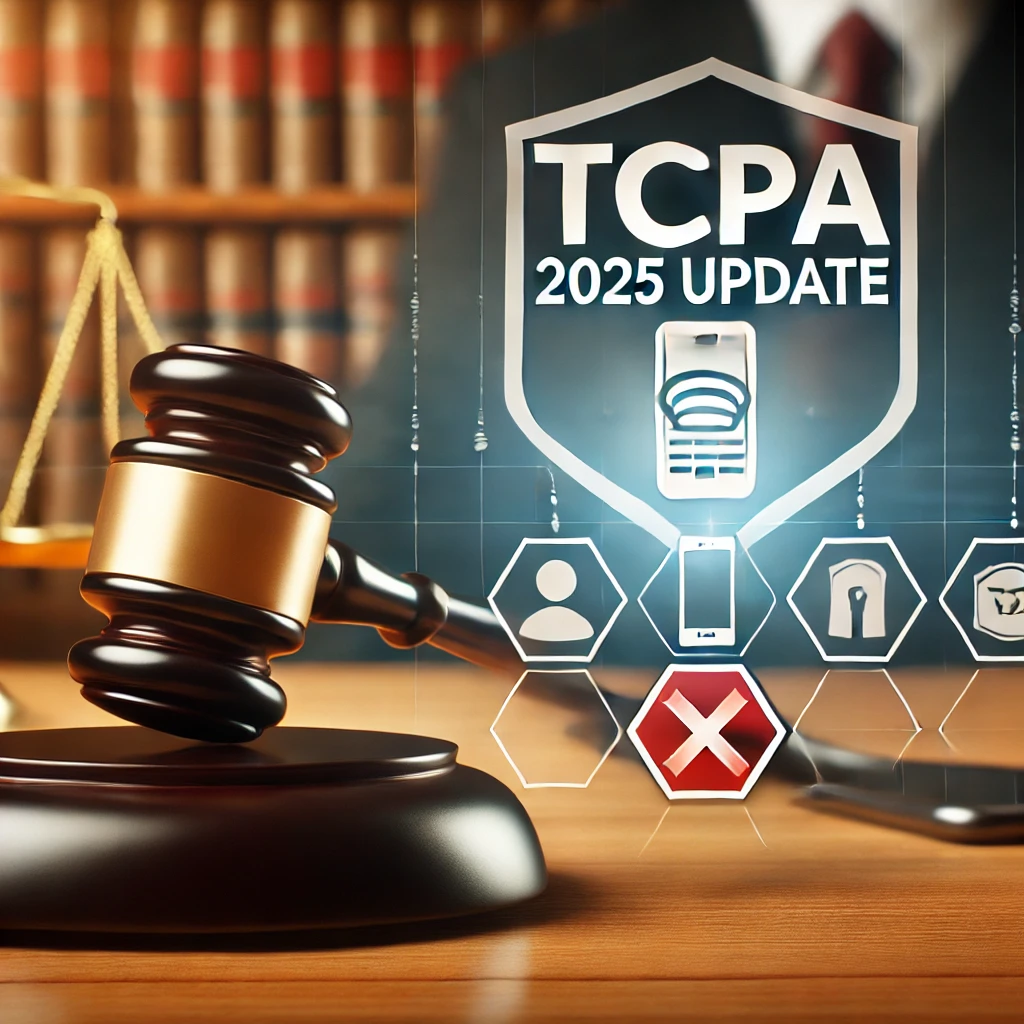
TCPA Compliance 2025: Navigating New FCC Robocall Rules
With TCPA compliance rules changing in 2025, what do businesses need to do to stay compliant? This guide will break down the new FCC regulations, the impact on your operations, and the steps to ensure you are prepared for the changes regarding TCPA Compliance 2025.
Key Takeaways
-
Starting January 27, 2025, businesses are required to obtain explicit ‘one-to-one’ consent from consumers for marketing communications using an Automatic Telephone Dialing System (ATDS).
-
The updated TCPA regulations mandate individual consent for each seller, affecting lead acquisition practices and potentially increasing costs for companies.
-
Failure to comply with TCPA regulations can result in significant financial penalties and legal repercussions, emphasizing the importance of maintaining thorough consent documentation and prompt response to revocation requests.
Overview of the Telephone Consumer Protection Act
The Telephone Consumer Protection Act (TCPA) was enacted by Congress in 1991 to address the growing issue of unwanted telemarketing calls and to protect consumer privacy. Initially, the TCPA imposed restrictions on telemarketing calls, the usage of automatic dialing systems, and prerecorded voice messages. These measures were designed to limit the volume of unsolicited communications that consumers were receiving, thereby enhancing their privacy and control over their personal information.
In 2003, the Federal Communications Commission (FCC) established a national Do-Not-Call registry to provide consumers with a more robust mechanism to opt out of telemarketing communications. This registry allowed individuals to register their telephone numbers, effectively blocking unsolicited calls from telemarketers. Additionally, rules were implemented requiring telemarketers to maintain do-not-call lists specific to their companies, further empowering consumers to limit unwanted calls.
Over the years, the TCPA has evolved to address new challenges in the telemarketing landscape. For instance, marketing text messages are now expressly covered by the National Do-Not-Call Registry, extending existing telemarketing protections to SMS communications. These continuous updates underscore the TCPA’s commitment to adapting to technological advancements and maintaining consumer privacy.
Key Changes in TCPA Compliance for 2025
As we approach 2025, new rules under the TCPA will come into effect, significantly altering the compliance landscape for businesses. Starting January 27, 2025, businesses must secure explicit ‘one-to-one’ consent from each lead for marketing outreach when using an Automatic Telephone Dialing System (ATDS). This change means that each identified seller must obtain individual consent from consumers, rather than relying on broad, blanket consents.
The new FCC regulations redefine consent, allowing only one identified seller to contact a consumer at a time for marketing purposes. This shift aims to close the ‘lead generation loophole’ and ensure that consumers are fully aware of who will be contacting them. Existing lead databases may become unusable if they do not meet the new individual consent requirements, compelling businesses to overhaul their data collection and storage practices.
The transition to ‘one-to-one’ consent is expected to raise lead acquisition costs as companies will need to ensure compliance with the consent process. However, this change also presents an opportunity for businesses to build more transparent and trustworthy relationships with their customers, ultimately leading to more effective and compliant marketing practices.
Obtaining Prior Express Written Consent
Obtaining prior express written consent is a critical component of TCPA compliance. This consent must be a signed agreement that authorizes a business to contact a consumer via calls or texts, specifying the telephone number to be reached. The updated definition of ‘prior express written consent’ specifies that such consent must be in writing and clearly authorize only one seller to send marketing messages. This means businesses can no longer rely on a single consent for multiple sellers; each consent must be obtained separately to obtain consent.
Compliance requires businesses to maintain a detailed checklist for obtaining and documenting explicit consumer gave consent and consumer giving consent. Documentation of consent should be stored by an independent third party to prevent any manipulation or alteration, ensuring its integrity. This practice not only helps in compliance but also builds consumer trust by demonstrating a commitment to transparency and accountability, including consumer provided consent and consumer’s consent.
It’s also essential for businesses to ensure that any robocalls or texts are logically related to the consumer’s earlier interactions that prompted consent. Informational calls using artificial voices can be made without express written consent, but prior express consent is still required.
The FCC’s 2025 ruling emphasizes that even previously obtained leads must have ‘one-to-one’ consent before any outreach after the effective date. This underscores the need for businesses to review and update their consent records regularly.
Role of the Federal Communications Commission
The Federal Communications Commission (FCC) plays a pivotal role in regulating and enforcing the TCPA. One of its significant contributions was the establishment of the national Do-Not-Call registry in 2003, which allowed consumers to opt out of telemarketing calls. The FCC has also made it clear that text messages are to be treated as calls under TCPA regulations, thereby enhancing consumer protection.
The FCC has recently heightened TCPA compliance standards, particularly affecting multi-location businesses. For instance, new regulations mandate that businesses must process a do-not-contact request within ten business days, creating a legal obligation that did not previously exist.
Additionally, wireless service providers will be required to block illegal text messages from specific numbers when notified by the FCC. These measures demonstrate the FCC’s commitment to adapting the TCPA to current technological and consumer protection needs.
Artificial or Prerecorded Voice Calls
The use of artificial or prerecorded voice calls is subject to specific regulations under the TCPA. Companies must obtain prior express written consent from consumers before making any artificial or prerecorded voice calls to them. This consent must detail the specific information required, ensuring that consumers are fully aware of what they are agreeing to.
Failure to comply with these regulations can result in significant financial penalties, legal consequences, and reputational harm to businesses engaging in unlawful calling practices.
Best practices for compliance include regular training for staff, thorough record-keeping of consents obtained, and clear communication about compliance obligations when working with third parties. These steps help ensure that businesses remain compliant and avoid the severe repercussions of non-compliance.
Automatic Telephone Dialing System (ATDS) Requirements
An Automatic Telephone Dialing System (ATDS) is defined as technology used to automatically dial telephone numbers and potentially send pre-recorded messages. Companies utilizing an ATDS must evaluate their technology to ensure it complies with the newly defined standards of consent. This includes verifying that the system can accurately manage and document individual consents as required by the new TCPA rules.
Compliance with these updated requirements helps businesses avoid legal repercussions and maintain consumer trust. Regular audits and updates to ATDS technology, in line with the latest regulatory standards, can help businesses stay ahead of compliance challenges.
Consumer’s Right to Revoke Consent
Consumers have the right to withdraw consent for robocalls and texts through various reasonable methods, and businesses must not limit these methods to one exclusive process. A revocation request sent through keywords like ‘stop’, ‘quit’, or ‘unsubscribe’ in response to a message is considered a valid means of consent withdrawal. This ensures that consumers can easily opt out of unwanted communications.
Even if a consumer uses an unapproved method to revoke consent, it can still create a rebuttable presumption of revocation if the request is substantiated. Therefore, businesses must provide an easy opt-out mechanism, such as a ‘STOP’ text option, and remind consumers of this process in communications.
The FCC stipulates that once a consumer uses the word ‘stop’ in a response to any communication, all contact must cease immediately, regardless of the content of the original message. Clear and visible disclosure about revocation rights is crucial for businesses to educate consumers on their ability to withdraw consent at any time.
Impact on Car Loan Comparison Shopping
The new TCPA rules will significantly impact car loan comparison shopping websites. These sites must ensure that disclosures to consumers about consent are clear and conspicuous, as consent must be logically associated with the services provided. The burden of proving consent under the new TCPA rules falls on the callers or texters, not on the lead generator websites, which must adapt to the new compliance requirements.
Comparison shopping websites can collect leads by providing options for consumers to choose specific businesses they wish to hear from, ensuring compliance with the new consent rules. Calls or texts resulting from consent obtained on these sites must be directly related to the purpose of that site, preventing unrelated marketing communications. This ensures that consumers receive relevant information while businesses stay compliant with the updated regulations.
Best Practices for TCPA Compliance
Best practices for TCPA compliance involve a multi-faceted approach. Here are some key steps to follow:
-
Provide a clear explanation of the type of communication consumers are consenting to.
-
Offer an easy opt-out mechanism.
-
Establish thorough consent tracking systems to ensure accurate documentation of consumer consent for marketing communications.
-
Implement real-time consent management to address opt-out requests efficiently and avoid any delays in communication cessation.
By following these steps, businesses can enhance their compliance with TCPA regulations.
Ongoing training for marketing and sales personnel about TCPA compliance protocols is crucial for maintaining adherence to regulations. Regular audits of consent documentation are recommended to ensure compliance and readiness in case of legal scrutiny.
Businesses must also update their contact management systems promptly to reflect a consumer’s revocation of consent to prevent future unauthorized communications. These steps collectively help businesses avoid costly violations and build a trustworthy relationship with their consumers.
Handling Revocation Requests in a Timely Manner
Responding to revocation requests in a timely manner is critical for compliance with TCPA regulations. Businesses must respond to these requests within ten business days, ensuring compliance with consumer requests for stopping further communications. Failure to respond in a timely manner may lead to violations of TCPA regulations, potentially resulting in legal repercussions.
A single confirmation text sent after a revocation request does not breach TCPA regulations if it solely acknowledges the opt-out without any promotional content. This practice helps businesses maintain compliance while providing clear communication to consumers about their opt-out status.
Multiple Sellers and Marketing Partners
In 2025, the FCC will enforce a new requirement mandating that consent for robocalls must be obtained for each individual seller, rather than a blanket consent for multiple sellers. This change requires businesses to implement stricter processes for obtaining consent to ensure compliance with TCPA regulations, especially in multi-party marketing scenarios.
The updated TCPA rules require that consent for robocalls or robotexts must be obtained on a one-to-one basis, meaning consumers must authorize each seller individually rather than providing blanket consent for multiple sellers. This shift aims to close the ‘lead generator loophole’ by mandating that marketers acquire consumer consent from each seller separately.
These changes underscore the need for businesses to adapt their consent collection practices to meet the new rule regulatory standards.
Consequences of Non-Compliance
Non-compliance with TCPA regulations can have severe consequences for businesses. Recent lawsuits against companies like Keller Williams highlight the importance of comprehensive marketing oversight to prevent TCPA violations. Consumers can recover damages of $500 for each violation of the National Do Not Call Registry. Regular audits of consent documentation are recommended to ensure compliance and readiness in case of legal scrutiny.
Failing to comply with the TCPA can result in significant financial penalties, legal actions, and reputational harm. Businesses must prioritize TCPA compliance to avoid these risks and maintain consumer trust.
By implementing best practices and staying informed about regulatory changes, businesses can navigate the complexities of TCPA compliance and ensure their marketing practices are both effective and lawful.
Summary
Navigating the new TCPA compliance rules for 2025 can seem daunting, but with careful attention to detail and a commitment to consumer privacy, businesses can successfully adapt. The key changes, such as the need for explicit ‘one-to-one’ consent and the role of the FCC in enforcing these rules, underscore the importance of thorough consent documentation and timely response to revocation requests. By understanding the requirements for artificial or prerecorded voice calls and the specific regulations surrounding the use of ATDS, businesses can avoid significant penalties and maintain consumer trust.
In conclusion, staying compliant with the TCPA is not just about avoiding fines or legal actions; it’s about building a transparent and respectful relationship with consumers. By implementing best practices, keeping abreast of regulatory changes, and ensuring all marketing efforts are compliant, businesses can turn these challenges into opportunities for growth and trust-building. Remember, compliance is not a one-time effort but an ongoing commitment to upholding the highest standards of consumer protection.
Frequently Asked Questions
What are the key changes to TCPA compliance starting in 2025?
Starting in 2025, key changes to TCPA compliance will require explicit ‘one-to-one’ consent for each seller, stricter documentation of prior express written consent, and enhanced rights for consumers to revoke that consent. It is crucial to prepare for these updates to ensure compliance.
How can businesses obtain prior express written consent?
Businesses can obtain prior express written consent by securing a signed agreement from consumers that explicitly authorizes the sending of marketing messages. This documentation should be stored securely, potentially with the help of an independent third party.
What role does the FCC play in TCPA compliance?
The FCC plays a crucial role in TCPA compliance by enforcing regulations, managing the national Do-Not-Call registry, and implementing mandates for handling do-not-contact requests and blocking illegal text messages. Their oversight ensures consumer protections in telecommunications.
What are the penalties for non-compliance with TCPA regulations?
Non-compliance with TCPA regulations can result in penalties ranging from $500 to $1,500 per violation, leading to substantial financial and legal consequences for businesses. It is crucial to adhere to these rules to avoid such repercussions.
How should businesses handle revocation requests?
Businesses should respond to revocation requests within ten business days and ensure an easy opt-out mechanism is available. Compliance is essential to avoid violations and potential legal repercussions.
Are you interested in finding out more? Browse the rest of our blog for other marketing tips. If you’re ready to create your first email, survey, sign-up form, or landing page then register for a free trial to get the tools you need to build powerful marketing campaigns!
© 2024, VerticalResponse. All rights reserved.



